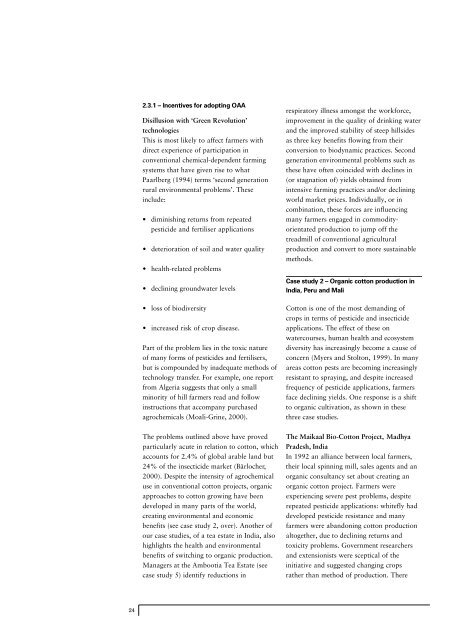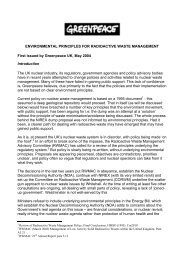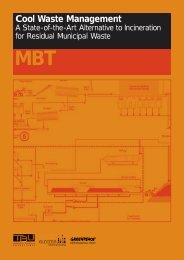The Real Green Revolution - Greenpeace UK
The Real Green Revolution - Greenpeace UK
The Real Green Revolution - Greenpeace UK
Create successful ePaper yourself
Turn your PDF publications into a flip-book with our unique Google optimized e-Paper software.
2.3.1 – Incentives for adopting OAA<br />
Disillusion with ‘<strong>Green</strong> <strong>Revolution</strong>’<br />
technologies<br />
This is most likely to affect farmers with<br />
direct experience of participation in<br />
conventional chemical-dependent farming<br />
systems that have given rise to what<br />
Paarlberg (1994) terms ‘second generation<br />
rural environmental problems’. <strong>The</strong>se<br />
include:<br />
• diminishing returns from repeated<br />
pesticide and fertiliser applications<br />
• deterioration of soil and water quality<br />
• health-related problems<br />
• declining groundwater levels<br />
• loss of biodiversity<br />
• increased risk of crop disease.<br />
P a rt of the problem lies in the toxic nature<br />
of many forms of pesticides and fert i l i s e r s ,<br />
but is compounded by inadequate methods of<br />
technology transfer. For example, one re p o rt<br />
f rom Algeria suggests that only a small<br />
minority of hill farmers read and follow<br />
i n s t ructions that accompany purc h a s e d<br />
a g rochemicals (Moali-Grine, 2000).<br />
<strong>The</strong> problems outlined above have proved<br />
particularly acute in relation to cotton, which<br />
accounts for 2.4% of global arable land but<br />
24% of the insecticide market (Bärlocher,<br />
2000). Despite the intensity of agrochemical<br />
use in conventional cotton projects, organic<br />
approaches to cotton growing have been<br />
developed in many parts of the world,<br />
creating environmental and economic<br />
benefits (see case study 2, over). Another of<br />
our case studies, of a tea estate in India, also<br />
highlights the health and environmental<br />
benefits of switching to organic production.<br />
Managers at the Ambootia Tea Estate (see<br />
case study 5) identify reductions in<br />
respiratory illness amongst the workforce,<br />
improvement in the quality of drinking water<br />
and the improved stability of steep hillsides<br />
as three key benefits flowing from their<br />
conversion to biodynamic practices. Second<br />
generation environmental problems such as<br />
these have often coincided with declines in<br />
(or stagnation of) yields obtained from<br />
intensive farming practices and/or declining<br />
world market prices. Individually, or in<br />
combination, these forces are influencing<br />
many farmers engaged in commodityorientated<br />
production to jump off the<br />
treadmill of conventional agricultural<br />
production and convert to more sustainable<br />
methods.<br />
Case study 2 – Organic cotton production in<br />
India, Peru and Mali<br />
Cotton is one of the most demanding of<br />
crops in terms of pesticide and insecticide<br />
applications. <strong>The</strong> effect of these on<br />
watercourses, human health and ecosystem<br />
diversity has increasingly become a cause of<br />
concern (Myers and Stolton, 1999). In many<br />
areas cotton pests are becoming increasingly<br />
resistant to spraying, and despite increased<br />
frequency of pesticide applications, farmers<br />
face declining yields. One response is a shift<br />
to organic cultivation, as shown in these<br />
three case studies.<br />
<strong>The</strong> Maikaal Bio-Cotton Project, Madhya<br />
Pradesh, India<br />
In 1992 an alliance between local farmers,<br />
their local spinning mill, sales agents and an<br />
organic consultancy set about creating an<br />
organic cotton project. Farmers were<br />
experiencing severe pest problems, despite<br />
repeated pesticide applications: whitefly had<br />
developed pesticide resistance and many<br />
farmers were abandoning cotton production<br />
altogether, due to declining returns and<br />
toxicity problems. Government researchers<br />
and extensionists were sceptical of the<br />
initiative and suggested changing crops<br />
rather than method of production. <strong>The</strong>re<br />
24




![[2007] EWHC 311 - Greenpeace UK](https://img.yumpu.com/22079793/1/184x260/2007-ewhc-311-greenpeace-uk.jpg?quality=85)












